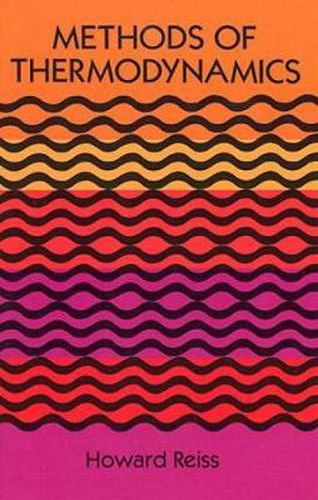Readings Newsletter
Become a Readings Member to make your shopping experience even easier.
Sign in or sign up for free!
You’re not far away from qualifying for FREE standard shipping within Australia
You’ve qualified for FREE standard shipping within Australia
The cart is loading…






Since there is no shortage of excellent general books on elementary thermodynamics, this book takes a different approach, focusing attention on the problem areas of understanding of concept and especially on the overwhelming but usually hidden role of
constraints
in thermodynamics, as well as on the lucid exposition of the significance, construction, and use (in the case of arbitrary systems) of the thermodynamic potential. It will be especially useful as an auxiliary text to be used along with any standard treatment.Unlike some texts, Methods of Thermodynamics does not use statistical mechanics as a crutch to explain the subject. In the author’s view, the student should learn to use the method of themodynamics in all its power, applying it to any problem it may help solve. As the author states:
In view of the high level of confidence which we place in thermodynamics, what is known thermodynamically is often considered to be known once and for all…by restricting oneself initially to purely thermodynamic arguments, one can know what he does know before entering domains where conclusions are less certain. Major chapter headings in this volume include: mathematical apparatus, the first law of thermodynamics, the second law and entropy, ideal substances, some useful formulas, internal equilibrium, and the extremal properties of the entropy, thermodynamic potentials, phase equilibria in simple systems, osmotic systems, systems which may perform surface work, systems in gravitational and centrifugal fields, elastic systems, stability, and third law. 1965 edition.
$9.00 standard shipping within Australia
FREE standard shipping within Australia for orders over $100.00
Express & International shipping calculated at checkout
Since there is no shortage of excellent general books on elementary thermodynamics, this book takes a different approach, focusing attention on the problem areas of understanding of concept and especially on the overwhelming but usually hidden role of
constraints
in thermodynamics, as well as on the lucid exposition of the significance, construction, and use (in the case of arbitrary systems) of the thermodynamic potential. It will be especially useful as an auxiliary text to be used along with any standard treatment.Unlike some texts, Methods of Thermodynamics does not use statistical mechanics as a crutch to explain the subject. In the author’s view, the student should learn to use the method of themodynamics in all its power, applying it to any problem it may help solve. As the author states:
In view of the high level of confidence which we place in thermodynamics, what is known thermodynamically is often considered to be known once and for all…by restricting oneself initially to purely thermodynamic arguments, one can know what he does know before entering domains where conclusions are less certain. Major chapter headings in this volume include: mathematical apparatus, the first law of thermodynamics, the second law and entropy, ideal substances, some useful formulas, internal equilibrium, and the extremal properties of the entropy, thermodynamic potentials, phase equilibria in simple systems, osmotic systems, systems which may perform surface work, systems in gravitational and centrifugal fields, elastic systems, stability, and third law. 1965 edition.